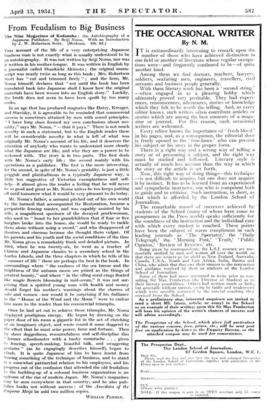From Feudalism to Big Business
The Nine Magazines of Kodansha : the Autobiography of a Japanese Publisher. By Seiji Noma. With an Introduction by J. W. Robertson Scott. (Methuen. 10s. 6d.)
Tins account of the life of a very enterprising Japanese business man is not exactly what is usually understood to be an autobiography. It was not written by Seiji Noma, nor was it written in his mother-tongue. It was written in English by a journalist called Shunkichi Akimoto ; the original manu- script was nearly twice as long as this book.; Mrs. Robertson Scott has "cut and trimmed freely " ; and the hero, Mr. Noma himself, declares that "not until the book has been translated back into Japanese shall I know how the original materials have been woven into an English story." Luckily, the broth does not seem to have been spoilt by too many cooks.
In an age that has produced magnates like Hatry, Kreuger, and Stavisky, it is agreeable to be reminded that commercial success is sometimes attained by men with sound principles.
I have long since formed my own conclusions about mo- rality," says Mr. Noma, "—that it pays." There is not much novelty in such a statement, but to the English reader there will be considerable novelty in what is left of what was originally Mr. Noma's account of his life, and it deserves the attention of anybody who wants to understand more clearly what the Japanese are like, and why they are a power to be reckoned with. The stork is in two parts. The first deals with Mr. Noma's early life ; the second mainly with his operations as a publisher. The first is the -more interesting, for the second, in spite of Mr. Noma's geniality, is just a little priggish and platitudinous in a typically Japanese way, a little too suggestive of Victorian exemplariness and self- help—it almost gives the reader a feeling that he will never be so good and great as Mr. Noma unless he too keeps putting off until tomorrow what it would be very pleasant to do today.
Mr. Noma's father, a samurai pitched out of his own world by the turmoil that accompanied the Restoration, became a peripatetic fencing master, and was capably assisted by his wife, a magnificent specimen of the decayed gentlewoman, who used to "boast to her grandchildren that if four or five burglars broke into the house, she would be ready to tackle them alone without using a sword," and who disapproved of theatres and cinemas because she thought them vulgar. Of his parents and his youth and the social conditions of the time Mr. Noma gives a remarkably frank and detailed picture. In 1904, when he was twenty-six, he went as a teacher of Chinese and Japanese classics to a secondary school in the Luchu Islands, and the three chapters in which he tells of his summer of life" there are perhaps the best in the book. In surroundings where "the coolness of the sea breeze and the brightness of the autumn moon are prized as the things of greatest beauty," and where "in the offing coral crags floated like magic flowers blooming in mid-ocean," it was not sur- prising that a spirited young man with health and money should forget his mother's warnings about the charms of sake and women—nor would it be surprising if his dalliance in the "House of the Wind and the Moon" were to endear
him more to the reader than his commercial triumphs. _
Once he had set out to achieve those triumphs, Mr. Noma displayed prodigious energy. He began by drawing on the Paper door of his room a gigantic fist in the act of clutching at an imaginary object, and wrote round it some doggerel to the effect that he must seize power, fame and fortune. Then by sheer doggedness, resourcefulness and self-discipline this " former schoolmaster with a bushy moustache . . . given to fencing, speech-making, boastful talk, and swaggering gestures" (as he engagingly describes himself), began to (-limb. It is quite Japanese of him to have learnt from fencing something of the technique of business, and to stand in a somewhat patriarchal relation to his employees, and his Progress out of the confusion that attended the old feudalism to the building-up of a colossal business organization is an epitome of the rise of modern Japan. Mr. Noma's magazines may be seen everywhere in that country, and he also pub- lishes books not without success : of the Anecdotes of the Emperor Meiji he sold two million copies.
Wria.riat PLomr..a.
















































 Previous page
Previous page